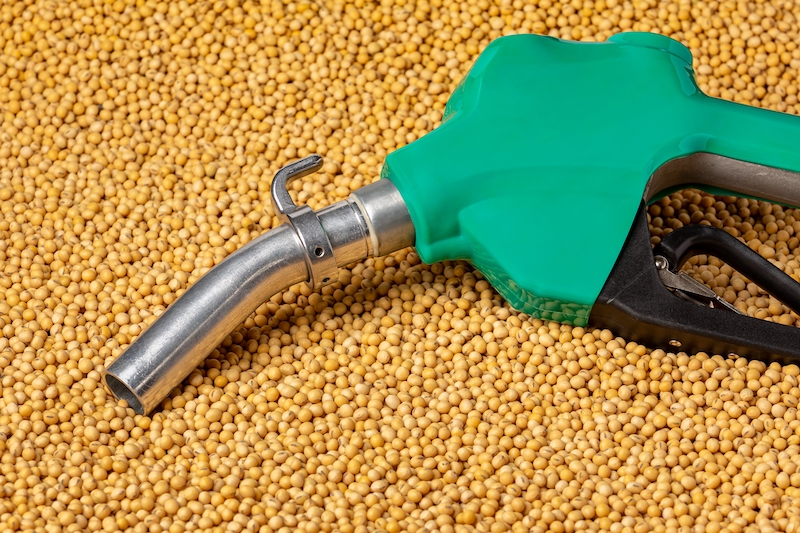
Whether sourced from soybeans or landfills, biofuels hurt our environment and economy. Photo: Shutterstock.
As New Englanders call for a clean energy transition, Big Oil and Gas are desperately scrambling to keep us hooked on their dirty products. Their latest attempt: greenwashed versions of their polluting fuels labeled as “renewable.” Let’s dig into yet another industry ploy to continue business as usual for the sake of polluting profits: biofuels.
Biofuels Will Not Help Us Slow Climate Change
Biofuels – like ethanol, biodiesel, and so-called “renewable” natural gas – are energy sources created from organic matter. That means things like corn, soybeans, wood, sewage sludge, landfill garbage and gas, and animal waste.
Fossil fuel companies want to sell biofuels as substitutes for the gas and diesel that currently power our vehicles and buildings. And while they may sound good on the surface, all biofuels emit climate-damaging pollution when burned. In fact, so-called “renewable” natural gas is chemically identical to natural gas. And biodiesel? It’s nearly chemically identical to diesel. In other words: Same polluting impact, different name.
We’ll grant that biofuels can help to displace fossil fuels in limited ways, such as in high-heat industrial processes. That’s because the technology to electrify them doesn’t currently exist. However, biofuels are not a viable climate solution at scale.
Biofuels Threaten Public Health
In addition to spewing climate-warming emissions, biofuels also pollute our air. Burning these fuels produces tiny toxic particles, ozone, and nitrogen dioxide. All three can severely irritate respiratory systems, triggering asthma attacks. Breathing in tiny toxic particles can lead to heart attacks, cancer, and premature death in people with lung or heart disease. And nitrogen dioxide and ozone pollution can lead to the development of asthma or other respiratory illnesses. Children and the elderly are even more at risk from this dangerous pollution.
People of color and low-income communities already bear an unfair burden from air pollution. That’s because racist and classist policies sited highways, power plants, waste incinerators, landfills, and other industrial facilities in their neighborhoods. The more biofuels we create, the more facilities we’ll need to process crops and waste. That will worsen the harms these communities already suffer.
Biofuels Hurt the Environment and Economy
Our natural landscapes act as carbon sinks: Plants, trees, grasslands, soil, and more all store carbon. To produce enough corn, soybeans, and wood for widespread use as biofuels, we would have to clear out these landscapes for farms – releasing all that stored carbon into the atmosphere. Soybean, corn, and any new trees planted for biofuel farms might eventually store some carbon. But the amount would fall far below what the land held before clearing.
Not to mention, depending on biofuel sources like corn and soybeans increases demand for these crops. That, in turn, will trigger monoculture agriculture: rearing only one type of tree or crop. Monoculture is notoriously harmful for the environment. It destroys biodiversity, reduces animal habitat, and erodes soil quality – leading to using more damaging chemical fertilizers to compensate. All these consequences pollute the environment, degrade soil and water, and harm the local flora and fauna.
Increased demand for corn and soybeans will also make these foods more expensive regionally, nationally, and globally. Those price spikes will impact us all. However, they fall hardest on low-income families, many of whom already contend with the food apartheid. Given that corn and soybeans are valuable staples of cultural cuisines and traditions, price spikes will also impact people of color the most.
Biofuels Encourage More Polluting, Expensive Practices
We cannot make enough biofuels to replace all fossil fuels. Instead, biodiesel must be mixed with diesel and so-called “renewable” natural gas with fossil gas. They will all use the same fossil fuel infrastructure we have right now, like leaky pipelines.
That means increasing our use of biofuels will only continue our dependence on the very fuels that cause the climate crisis. What’s more, they will make it nearly impossible to meet our climate targets and slow climate change.
And biofuels are not cheap. In fact, they typically cost far more than their fossil fuel counterparts. Blending biofuels into fossil fuels could increase New England’s energy costs – significantly impacting lower and moderate-income households.
The Answer to Our Energy Needs Is Real Clean Energy
Biofuels are a greenwashed, business-as-usual solution from the very perpetrators of our climate crisis: the fossil fuel industry. These fuels distract us from our target of reaching net zero emissions by 2050.
Biofuels are not a viable climate solution across the economy. Some minimal sources of methane, like landfills and anaerobic digesters, could help slash climate-damaging pollution in the hardest-to-electrify industries as we get rid of fossil fuels – if handled properly. But nowhere near enough of this kind of biofuel exists (or could be generated) to use in homes, most businesses, or cars. These fuels harm the environment, damage the climate, and hurt our health. And they leave us tied down to fossil fuels when we should be moving away from them.
Despite the fossil fuel industry’s rhetoric, solar and wind power are cheaper and cleaner than any biofuel. That’s where we should be investing New England’s resources. Because using real renewable energy and electrifying everything – from our heating to our cars – are cheaper, safer options for New Englanders and our climate.



